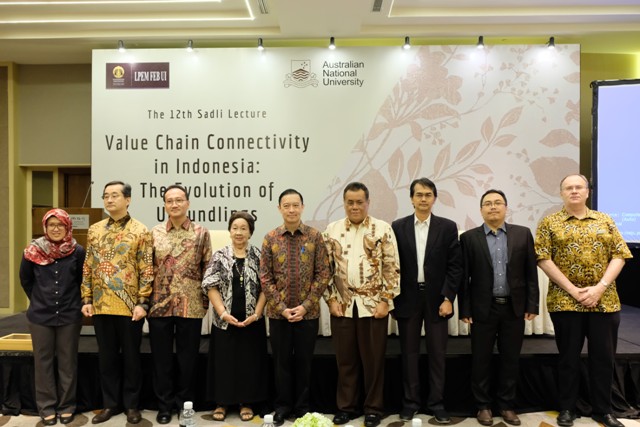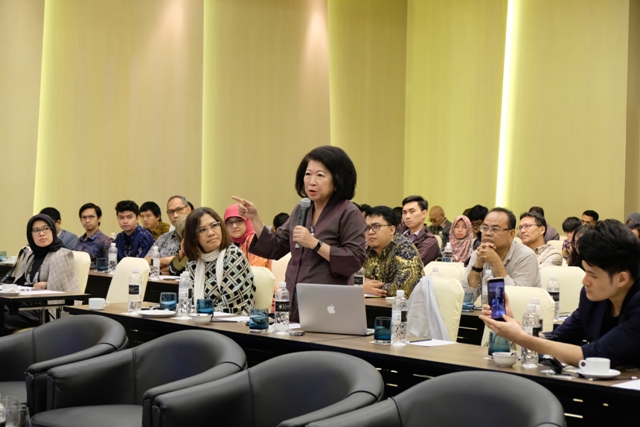The Sadli Lecture is an annual event convened by LPEM FEB UI and the ANU Indonesia Project. Currently in its 12th year, the last Sadli Lecture was held at Hotel Pullman Thamrin on May 2nd 2018. This year’s Sadli Lecture Speaker was Professor Fukunari Kimura (Keio University, Tokyo and ERIA, Jakarta) entitled: Value Chain Connectivity in Indonesia: The Evolution on Unbundling. T.M. Zakir Machmud (UKM Center FEB UI) and Yos Adiguna Ginting (Indonesia Service Dialogue and PT HM Sampoerna) were discussants.
The event was opened by Professor Ari Kuncoro (Dean of FEB UI) who extended his appreciation for the ongoing collaboration between FEB UI and the ANU Indonesia Project. The Lecture is the second longest-running event at FEB UI, and Professor Kuncoro hopes that the Lecture continues to inspire academics to do good research that influences policy.
The Chairman of the the Indonesia Investment Coordinating Board (BKPM) Thomas Trikasih Lembong followed with his keynote address where he noted that Professor Sadli was the first Chairman of BKPM, laying the foundation for the future of the agency. Chairman Lembong then reflected on economics as a science that can not answer many dillemas, and urge economists to work others in the social, technological, and cultural realms.

Chairman Thomas Lembong receiving a token of appreciation from Dean FEB UI, while Professor Saparinah Sadli looks on
The Lecture continued with Professor Fukunari Kimura’s presentation where he introduced the term “unbundling” (developed by economist Richard Baldwin) as reconfiguration of economic activities in response to technological changes. The evolution of the unbundlings are split into three levels, where the first is related to industry-wise division of labor; second is the task-wise division of labor; and third is the person-wise division of labor. For developing countries such as Indonesia, upgrading the capability for higher levels of unbundlings would be key for improving the economy. Professor Kimura went on to explain briefly how unbundling evolves globally as technology intervened in the international division of labor. Indonesia’s position in global unbundling, as presented, is measured using indicators such as representative industries, key technological capability, and geographic condition at each level of unbundling.
The presentation went on to explain how Indonesia’s trade patterns were driven by each level of unbundlings. The first unbundling was marked by industrialization in Indonesia, but concentrated largely on Java and Riau Islands. The second unbundling was marked by improvement in the machinery industries, improving production capacity, although still largely concentrated in the same limited region. As for the third unbundling, Indonesia has not yet fully integrated itself to this phase. Given Indonesia’s youth population, the country should be able to deepen its involvement in the global value chains, and one mechanisms is by integrating more into the digital economy. In closing his presentation, Professor Kimura suggested policies that can help Indonesia is preparing for the third unbundling.
In his comment, the first discussant Yos Adiguna Ginting highlighted the issue of policy intervention, agreeing with Professor Kimura on the need for the government bureaucracy to be supportive of firms’ involvement in global value chains. He outlined the experience of PT HM Sampoerna in undergoing the various stages of unbundlings over time since the company’s inception, and currently the third wave of unbundlings saw the cigarette firm morphing into a digital services firm. The second discussant T.M. Zakir Machmud appreciated Prof. Kimura’s paper as a “very relevant to the Indonesian cases recently”. He focused on the issue of the third unbundling condition in Indonesia, heavily driven by the digital economy and effectively reducing transaction costs.
Some article on the event:
ERIA: ERIA Chief Economist Discusses the Evolution of Unbundlings in Indonesia






